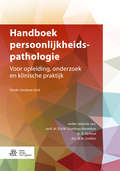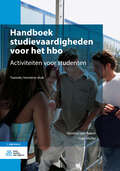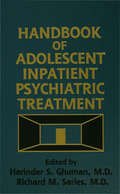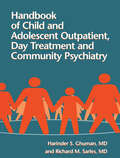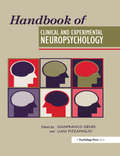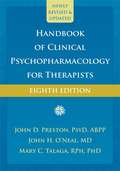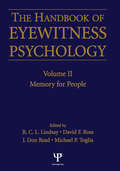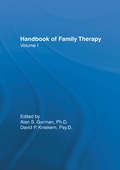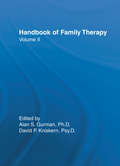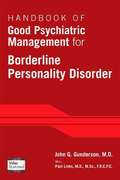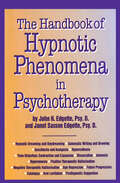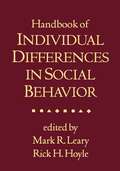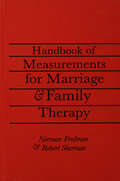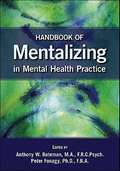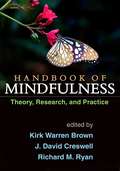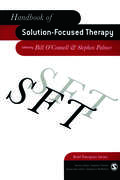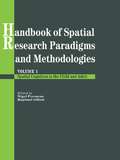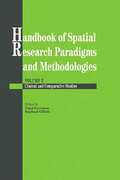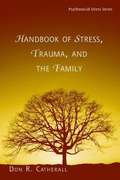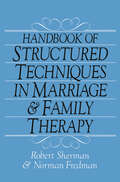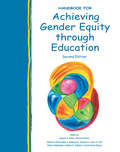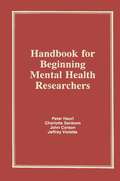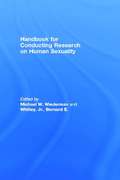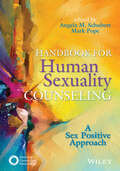- Table View
- List View
Handboek ontwikkelingspsychologie: Grondslagen en theorieën
by L. Verhofstadt-Denève P. Geert A. VytDeze vijfde, grondig herziene druk van het Handboek ontwikkelingspsychologie geeft een volledig, geactualiseerd en geïntegreerd overzicht van de belangrijkste theorieën op het gebied van de ontwikkelingspsychologie. Alhoewel het boek is uitgebreid met de meest recente ontwikkelingen op dit vakgebied, blijven de klassieke modellen en onderzoeksgegevens een belangrijke plek innemen. Uitgebreide praktijkvoorbeelden geven het nut weer van de besproken theorieën voor opvoeding, onderwijs, klinisch–therapeutische situaties en interpretatie van dagelijks gedrag.Allereerst worden de uitgangspunten van de ontwikkelingspsychologie als wetenschap besproken. Vervolgens komen de voornaamste actuele stromingen aan bod, met bijzondere aandacht voor hun bijdragen aan de ontwikkelingspsychologie. Doordat deze theorieën vanuit verschillende gezichtspunten besproken worden, wordt duidelijk dat zij elkaar meer aanvullen dan tegenspreken. Het boek wordt afgesloten met een overzichtelijk syntheseschema, waarin de behandelde theorieën kritisch vergelijkend worden samengevat.Het Handboek ontwikkelingspsychologie is niet alleen geschreven voor psychologen en pedagogen in opleiding, maar is ook zeer geschikt als naslagwerk voor afgestudeerden. Om deze reden werd ook een uitgebreid register van kernbegrippen opgenomen. Het boek is geschreven in een stijl die geen expliciete voorkennis van de psychologie vereist, en is daarom ook zeer geschikt voor studenten van andere studierichtingen en de geïnteresseerde leek.
Handboek persoonlijkheidspathologie: Voor opleiding, onderzoek en klinische praktijk
by E.H.M. Eurelings-Bontekoe R. Verheul W. M. SnellenDit welbekende handboek biedt een brede en geïntegreerde kijk op (complexe) persoonlijkheidspathologie en –problematiek en gaat uitvoerig in op diagnostiek en behandeling ervan. Deze geheel herziene derde druk is aangepast aan de nieuwste ontwikkelingen en aan de DSM-5. Er is een hoofdstuk toegevoegd over het in de DSM-5 sectie III opgenomen alternatieve model voor het diagnosticeren van persoonlijkheidspathologie. De gewijzigde visie op 'somatoforme stoornissen' van de DSM-5 is toegevoegd. Daarnaast is er aandacht voor de nieuwste ontwikkeling op het gebied van de netwerk- en symptoomtrajectbenadering van psychopathologie. Aan de orde komen ook neurofysiologische correlaten en de invloed van gen-omgevingstransactie op het ontstaan van persoonlijkheidspathologie. Er wordt ingegaan op de voorlopers van ernstige persoonlijkheidsproblematiek in de vroege ontwikkeling van het kind en de invloed van langdurige vroegkinderlijke negatieve ervaringen op de ontwikkeling van de borderline persoonlijkheidsstoornis. Opnieuw hebben vele experts vanuit uiteenlopende referentiekaders, recente wetenschappelijke bevindingen en inzichten, en diagnostische en behandelmethodieken een bijdrage geleverd aan dit boek. Het is zowel een naslagwerk als praktisch boek voor psychologen, gz-psychologen, klinisch psychologen, psychiaters en zij die daartoe in opleiding zijn.
Handboek studievaardigheden voor het hbo: Activiteiten voor studenten
by Nicolien Van Halem Inge MüllerIn Handboek studievaardigheden voor het hbo staan 74 verschillende leeractiviteiten opgenomen met de daarbij horende werkwijze. Hoe bereid je een project, presentatie, tentamen of een stage voor? Hoe geef je constructieve feedback? Iedere activiteit is uitgewerkt naar inhoud, met een doel en stappenplan. En geeft antwoord op tal van vragen over onder andere samenwerken, studeren en projectmatig werken. Verder krijg je bij het onderdeel Tips adviezen hoe je missers kunt voorkomen en hoe je variatie en diepgang in de activiteit kunt aanbrengen.Het handboek sluit aan bij actuele onderwijsontwikkelingen zoals de inzet van digitale toepassingen en competentiegericht opleiden. Daarnaast is er aandacht voor literatuurstudie en studeren voor een tentamen, maar ook voor werken in een elektronische leeromgeving, onderzoek doen en verzamelen van je portfolio. Individueel leren en samenwerken komen beiden aan bod.Met deze 2e herziene druk leer je op een actieve manier voor je toekomstige beroep. De speciaal voor deze druk ontwikkelde website biedt de daarbij horende digitale en gebruiksvriendelijke ondersteuning. Met alle kwaliteiten die daarvoor nodig zijn: gedegen vakkennis, praktische vaardigheden en een goede beroepshouding. Handboek studievaardigheden voor het hbo is tijdens je hele studie een waardevol hulpmiddel bij het uitvoeren van opdrachten op school en tijdens je stage. Kortom: een onmisbaar naslagwerk!
Handbook Of Adolescent Inpatient Psychiatric Treatment
by Harinder S. Ghuman Richard M. SarlesFirst published in 1994. Routledge is an imprint of Taylor & Francis, an informa company.
Handbook Of Child And Adolescent Outpatient, Day Treatment A
by Harinder S. Ghuman Richard M. SarlesIn the past few years, there has been a major shift in the mental health care of child and adolescents from inpatient care to non-hospital community ambulatory settings. Economic pressures have primarily driven this change in service delivery. Insurance companies and managed care organizations have not only restricted access to hospitalization and limited length of stays but additionally have sharply reduced reimbursements for treatments. State and federal policies for inpatient treatment and reimbursement have followed similar trends. As a result, mental health planners have attempted to develop programs to deal with this trend of restricted inpatient care shifting treatment of children and adolescents to home and community settings. Some of these new programs are well planned and others are hastily planned and implemented. The pitfall to this community approach is that there is a population of chronically disturbed children and adolescents, and highly stressed parents often lacking adequate personal and family resource who may not respond to these new less restrictive, less costly community approaches which potentially may lead to an unsafe and dangerous situation for the child, adolescent, family and the community.With this in mind, the purpose of this book is to provide comprehensive and up-to-date information regarding child and adolescent outpatient, day treatment and community psychiatry. The emphasis of this book is to provide practical knowledge through clinical case illustrations and to explain various strategies in a detailed fashion.
Handbook Of Clinical And Experimental Neuropsychology
by Gianfranco Denes Luigi PizzamiglioThe domain of neuroscience has had one of the most explosive growths in recent decades: within this development there has been a remarkable and renewed interest in the study of the relations between behaviour and the central nervous system. Part of this new attention is connected with the contribution of new technologies (PET, fMRI) permitting more precise mapping of neural structures responsible for cognitive functions and the development of new theoretical models of mental activities.The diffusion of new pathologies (for example the pattern of cognitive impairment associated with AIDS) has further enlarged the field of clinical neuropsychology. Finally there has been an expanding clinical interest in the understanding and management of age-related cognitive changes.This volume is the translated and updated version of the second edition of Manuale di Neuropsicologia (Zanichelli, 1996), by the same authors, and it reflects the current status of the art. It is intended to blend clinical and theoretical aspects of neuropsychology. The first part discusses the instrumental and clinical methods of investigation in neuropsychology, together with their development. A long section is dedicated to the language and memory disorders. The impairment of non-verbal cognitve functions, such as the disorders of space orientation, of of visuo-perceptive abilities, and of the emotions and attention, are extensively discussed. The pattern of degenerative dementias is thorougly described, as e is thoroughly described, as well as a number of new topics, such as a neuropsychological approach to consciousness. Finally, perspectives for treatment of some cognitive disorders are outlined.
Handbook Of Clinical Psychopharmacology For Therapists
by John D. Preston John H. O'Neal Mary C. TalagaThis book is intended primarily for mental health professionals and those in graduate training in psychology, social work, psychiatric nursing, and counseling. The professional goal of most readers will be to provide services that aim to reduce emotional pain, to promote psychological growth and healing
Handbook Of Eyewitness Psychology 2 Volume Set: Memory For Events
by Michael P. Toglia David F. Ross J. Don Read R. C. L. LindsayThe Handbook of Eyewitness Psychology presents a survey of research and legal opinions from international experts on the rapidly expanding scientific literature addressing the accuracy and limitations of eyewitnesses as a source of evidence for the courts. For the first time, extensive reviews of factors influencing witnesses of all ages – children, adults, and the elderly – are compiled in a single pair of volumes. The disparate research currently being conducted in eyewitness memory in psychology, criminal justice, and legal studies is coherently presented in this work. Volume 1 covers memory for events. Volume 2 cover memory for people.
Handbook Of Family Therapy
by Alan S. Gurman David P. KniskernFirst published in 1981. This volume is unique as to date no previous book, and no collection of papers one could assemble from the literature, addresses or achieves for the field of family therapy what is accomplished in this handbook. It responds to a pressing need for a comprehensive source that will enable students, practitioners and researchers to compare and assess critically for themselves an array of major current clinical concepts in family therapy.
Handbook Of Family Therapy
by Alan S. Gurman David P. KniskernThis volume reflects the achievements in developing new concepts and models of family therapy and new approaches to special clinical issues and problems during the 1980s. Chapters by experts such as Boszormenyi-Nagy, Everett, Guttman, Lankton, Liddle, McGoldrick, Madanes, and Walsh offer insight into a variety of areas including systems theory, cybernetics, and epistemology; contextual therapy; Ericksonian therapy; strategic family therapy; treating divorce in family therapy practice; ethnicity and family therapy; and training and supervision in family therapy.
Handbook Of Good Psychiatric Management For Borderline Personality Disorder
by John G. Gunderson Paul S. LinksThe Handbook of Good Psychiatric Management for Borderline Personality Disorder teaches clinicians what to do and how to do it, as well as what not to do and how to avoid it. The author, a renowned researcher and clinician, has developed a new evidence-based treatment, Good Psychiatric Management (GPM) that comfortably utilizes cognitive, behavioral, and psychodynamic interventions that are practical and simple to implement. Because psychoeducation is an important component of GPM, the book teaches clinicians how to educate their patients about BPD, including the role of genetics and the expected course of the disease. This approach offers advantages both to practitioners, who become more adept at honest communication, and to patients, who are encouraged to have realistic hopes and to focus on strategies for coping with BPD in daily life.
Handbook Of Hypnotic Phenomena In Psychotherapy
by Janet Sasson Edgette John H. EdgetteDespite their clinical utility, hypnotic phenomena are vastly underutilized by therapists in their work with patients. Whether this is due to uncertainty about how to use specific techniques constructively or how to elicit particular phenomena, or anxiety about not being able to obtain a desired result, this volume will guide hypnotherapists toward higher levels of clinical expertise. By describing varied hypnotic phenomena and how they can be used as vehicles of intervention, The Phenomenon of Ericksonian Hypnosis takes the therapist beyond these fundamental applications toward a broader, more sophisticated scope of practice. This immensely readable book addresses the selection, eliciting, and therapeutic use of hypnotic phenomena that are natural outgrowths of trance. It offers step?by?step instruction on eliciting age progression, hypnotic dreaming, hypnotic deafness, anethesia, negative and positive hallucination, hypermnesia, catalepsy, and other hypnotic phenomena. The book includes specific instruction on how to use the phenomena manifested in trance to provide more effective treatment. Numerous case examples vividly illustrate intervention with anxiety disorders, trauma and abuse, dissociative disorders, depression, marital and family problems, sports and creative performance, pain, hypersensitivity to sound, psychotic symptomatology, and other conditions. The Phenomenon of Ericksonian Hypnosis will be used by therapists as a valuable clinical tool to expand their conceptualizations of hypnosis, and thus enable them to offer a wider repertoire of skills with which they can confidently treat clients.
Handbook Of Individual Differences In Social Behavior
by Mark R. Leary Rick H. HoyleHow do individual differences interact with situational factors to shape social behavior? Are people with certain traits more likely to form lasting marriages; experience test-taking anxiety; break the law; feel optimistic about the future? This handbook provides a comprehensive, authoritative examination of the full range of personality variables associated with interpersonal judgment, behavior, and emotion. The contributors are acknowledged experts who have conducted influential research on the constructs they address. Chapters discuss how each personality attribute is conceptualized and assessed, review the strengths and limitations of available measures (including child and adolescent measures, when available), present important findings related to social behavior, and identify directions for future study.
Handbook Of Measurements For Marriage And Family Therapy
by Robert Sherman, Ed.D. Norman Fredman, Ph.D.Published in 1987, Handbook of Measurements For Marriage And Family Therapy is a valuable contribution to the field of Family Therapy. The purpose of this handbook is to provide a single convenient source to which practitioners, researchers, and trainees can turn in order to learn how to use marriage and family instruments and to find descriptions of instruments suited to their needs.
Handbook Of Mentalizing In Mental Health Practice
by Peter Fonagy Anthony W. BatemanMentalization-based therapy is a specific type of psychotherapy designed to help people consider their own thoughts and feelings and differentiate them from the perspectives of others. The editors are the foremost experts on mentalizing, having published two previous books and a multitude of scholarly papers defining it and describing its multiple clinical applications. Handbook of Mentalizing in Mental Health Practice is by far the most cutting-edge, comprehensive source of information and instruction on this critical therapeutic technique, with everything clinicians need to know to integrate mentalizing into their therapeutic repertoire. The editors maintain that the aim of mentalizing therapy is to enhance a mentalizing process, regardless of the context in which it is being delivered. Thus, while most often employed in individual therapy, it can also be useful in group and family therapy situations. Similarly, it may prove equally effective in inpatient and outpatient contexts, and in standard and brief therapy modes. What is critical is the therapist's focus on the patient's "mind-mindedness" as it applies to his or her subjective experience of reality and to awareness of other people's perspectives. Here are some of the key observations made in this fascinating book: * Evidence suggests that people who have been diagnosed with a personality disorder may have specific deficits in mentalizing in the context of attachment relationships, and that this group transcends the classification of borderline personality disorder (BPD), which the authors had previously identified with such deficits. This has profound implications for treatment of all types of personality disorders. * The authors now see mentalizing as a developmental construct that is extended to the family and throughout an individual's development. This insight suggests that intervention -- and even prevention of deficits -- may be possible. * Because mentalizing is a fundamental psychological process, it interfaces with all major mental disorders. This means that mentalizing techniques may have the potential to improve well-being across a range of disorders, including depression, eating disorders, addiction, and even the less severe forms of antisocial personality disorder. * Adolescence, the phase of development where personality disorder, depression, eating disorders, substance abuse, and other disorders first emerge, is a critical period for identification of mentalizing deficits and the time when intervention can do enormous good. These insights are tremendously useful for any practitioner of psychotherapy, as well as students in the field. Exhaustive in its coverage of the nature, practice, and exciting potential of this relatively new approach, Handbook of Mentalizing in Mental Health Practice is destined to become a classic in the literature of psychotherapy.
Handbook Of Mindfulness: Theory, Research, And Practice
by Richard Ryan Kirk Brown J. CreswellAn authoritative handbook, this volume offers both a comprehensive review of the current science of mindfulness and a guide to its ongoing evolution. Leading scholars explore mindfulness in the context of contemporary psychological theories of attention, perceptual processing, motivation, and behavior, as well as within a rich cross-disciplinary dialogue with the contemplative traditions. After surveying basic research from neurobiological, cognitive, emotional/affective, and interpersonal perspectives, the book delves into applications of mindfulness practice in healthy and clinical populations, reviewing a growing evidence base. Examined are interventions for behavioral and emotion dysregulation disorders, depression, anxiety, and addictions, and for physical health conditions.
Handbook Of Solution-Focused Therapy
by Stephen Palmer Bill O'ConnellOn a scale of 0-10 I would give the Handbook of Solution Focused Therapy a nine - it met my best hopes in terms of an insight into the theory and mechanics of SFT, and gave me ideas for extending my current use of the therapy. I found it engaging, readable and well-presented, with useful reference lists within each chapter to guide further reading' - Solution News `This collection of fifteen chapters, each written by a different specialist in the SFT field, is a valuable contribution to the Solution-Focused therapist's bookshelf. A must-read for any informed SF therapy practitioner - Mark McKergow, The Solutions Focus `This book has 14 chapters on diverse applications of Solution-Focus, between introductory and closing chapters by Bill O'Connell. The book relates to work being done in the UK and in Ireland, excepting Alasdair MacDonald's piece on research in SFT, which is an up-to-date and welcome review of research findings world-wide. All the chapters are succinct and they convey a clear impression of the lightness and excitement of this approach, for service-users and therapists alike. The book is a good read for any therapist, professional helper or service manager' - Robert Cumming , Nurturing Potential Solution-Focused therapy is an increasingly popular approach, used by practitioners in a wide range of contexts and settings. Illustrating the breadth and depth of contemporary practice, the Handbook of Solution-Focused Therapy brings together contributions from leading practitioners in fields such as social work, education and health care to show how solution-focused techniques can be effective in many different situations. Beginning with an introduction to the origins and theory of the approach, the book examines different areas of practice, explaining how and why the solution-focused approach is applicable and highlighting the issues specific to each context. Each chapter features a case-example, which demonstrates the practical advantages and difficulties, involved in using the solution-focused approach. The Handbook of Solution-Focused Therapy is an ideal text for training courses in solution-focused therapy and a source of new ideas for practitioners trained in other approaches who want to integrate solution-focused techniques with their existing practice. Bill O'Connell is a Senior Lecturer in Counselling at University of Birmingham and author of Solution-Focused Therapy (SAGE 1998) and Solution-Focused Stress Counselling (Continuum 2001). Professor Stephen Palmer is Director of the Centre for Stress Management and the Centre for Coaching, London. He has written and edited over 25 books.
Handbook Of Spatial Research Paradigms And Methodologies
by Nigel Foreman Raphael GillettSpatial cognition is a broad field of enquiry, emerging from a wide range of disciplines and incorporating a wide variety of paradigms that have been employed with human and animal subjects. This volume is part of a two- volume handbook reviewing the major paradigms used in each of the contributors' research areas.; This volume considers the issues of neurophysiological aspects of spatial cognition, the assessment of cognitive spatial deficits arising from neural damage in humans and animals, and the observation of spatial behaviours in animals in their natural habitats.; This handbook should be of interest to new and old students alike. The student new to spatial research can be brought up-to- speed with a particular range of techniques, made aware of the background and pitfalls of particular approaches, and directed toward useful sources. For seasoned researchers, the handbook provides a rapid scan of the available tools that they might wish to consider as alternatives when wishing to answer a particular "spatial" research problem.
Handbook Of Spatial Research Paradigms And Methodologies
by Nigel Foreman Raphael GillettSpatial cognition is a broad field of enquiry, emerging from a wide range of disciplines and incorporating a wide variety of paradigms that have been employed with human and animal subjects. This volume is part of a two- volume handbook reviewing the major paradigms used in each of the contributors' research areas.; This volume considers the issues of neurophysiological aspects of spatial cognition, the assessment of cognitive spatial deficits arising from neural damage in humans and animals, and the observation of spatial behaviours in animals in their natural habitats.; This handbook should be of interest to new and old students alike. The student new to spatial research can be brought up-to- speed with a particular range of techniques, made aware of the background and pitfalls of particular approaches, and directed toward useful sources. For seasoned researchers, the handbook provides a rapid scan of the available tools that they might wish to consider as alternatives when wishing to answer a particular "spatial" research problem.
Handbook Of Stress, Trauma, And The Family (Routledge Psychosocial Stress)
by Don R. CatherallThe Handbook of Stress, Trauma, and the Family is broken down into three sections, compiling research, theory and practice. The first section focuses on how traumatic stress affects intimate others, what familial characteristics affect individual susceptibility to trauma, as well as evaluation of the effectiveness of various interventions. The section on theory explores concepts of stress and intrapsychic processes underlying the intergenerational transmission of trauma, addressesing how families can buffer or enhance anxiety. The final section, entitled practice, covers assessment (presenting both the Circumplex Model and Bowenian family theory models), treatment models and treatment formats for specific populations. The major family treatment models applicable to stress and trauma are discussed, including contextual, object relations, emotionally focused and critical interaction therapy.
Handbook Of Structured Techniques In Marriage And Family Therapy
by Robert Sherman Norman FredmanPublished in the year 1986, Handbook of Structured Techniques in Marriage and Family Therapy is a valuable contribution to the field of Family Therapy.
Handbook for Achieving Gender Equity Through Education
by Susan S. KleinFirst published in 1985, the Handbook for Achieving Gender Equity Through Education quickly established itself as the essential reference work concerning gender equity in education. This new, expanded edition provides a 20-year retrospective of the field, one that has the great advantage of documenting U.S. national data on the gains and losses in the efforts to advance gender equality through policies such as Title IX, the landmark federal law prohibiting sex discrimination in education, equity programs and research. Key features include: Expertise – Like its predecessor, over 200 expert authors and reviewers provide accurate, consensus, research-based information on the nature of gender equity challenges and what is needed to meet them at all levels of education. Content Area Focus – The analysis of gender equity within specific curriculum areas has been expanded from 6 to 10 chapters including mathematics, science, and engineering. Global/Diversity Focus – Global gender equity is addressed in a separate chapter as well as in numerous other chapters. The expanded section on gender equity strategies for diverse populations contains seven chapters on African Americans, Latina/os, Asian and Pacific Island Americans, American Indians, gifted students, students with disabilities, and lesbian, gay, bisexual, and transgender students. Action Oriented – All chapters contain practical recommendations for making education activities and outcomes more gender equitable. A final chapter consolidates individual chapter recommendations for educators, policymakers, and researchers to achieve gender equity in and through education. New Material – Expanded from 25 to 31 chapters, this new edition includes: *more emphasis on male gender equity and on sexuality issues;*special within population gender equity challenges (race, ability and disability, etc);*coeducation and single sex education;*increased use of rigorous research strategies such as meta-analysis showing more sex similarities and fewer sex differences and of evaluations of implementation programs;*technology and gender equity is now treated in three chapters;*women’s and gender studies;*communication skills relating to English, bilingual, and foreign language learning; and*history and implementation of Title IX and other federal and state policies. Since there is so much misleading information about gender equity and education, this Handbook will be essential for anyone who wants accurate, research-based information on controversial gender equity issues—journalists, policy makers, teachers, Title IX coordinators, equity trainers, women’s and gender study faculty, students, and parents.
Handbook for Beginning Mental Health Researchers
by Charlotte SanbornIn fulfilling the need for a beginner's manual in mental health research, the authors have written an insightful exposition of the fundamental factors essential to good research. This articulately written manual teaches how to formulate a clear hypothesis, select a representative population, conduct a valid study, and describe results in an intelligible manner. The experienced authors thoroughly explain the need for acquiring a research attitude--an inquiring and critical mind--and then discuss how mental health research is done, using anecdotal case reports, studies with only a few variables, and complex investigations of multiple variables as examples. A wide range of research possiblilities is explored, including those that require little or no financial support.
Handbook for Conducting Research on Human Sexuality
by Michael W. Wiederman Bernard E. WhitleyHuman sexuality researchers often find themselves faced with questions that entail conceptual, methodological, or ethical issues for which their professional training or prior experience may not have prepared them. The goal of this handbook is to provide that guidance to students and professionals interested in the empirical study of human sexuality from behavioral and social scientific perspectives. It provides practical and concrete advice about conducting human sexuality research and addresses issues inherent to both general social scientific and specific human sexuality research. This comprehensive resource offers a unique multidisciplinary examination of the specific methodological issues inherent in conducting human sexuality research. The methodological techniques and advances that are familiar to researchers trained in one discipline are often unfamiliar to researchers from other disciplines. This book is intended to help enrich the communication between the various disciplines involved in human sexuality research. Each of the 21 self-standing chapters provides an expert overview of a particular area of research methodology from a variety of academic disciplines. It addresses those issues unique to human sexuality research, such as: * how to measure sexuality variables; * how to design studies, recruit participants, and collect data; * how to consider cultural and ethical issues; and * how to perform and interpret statistical analyses. This book is intended as a reference tool for researchers and students interested in human sexuality from a variety of disciplines, including psychology, sociology, family science, health communication, nursing, medicine, and anthropology.
Handbook for Human Sexuality Counseling: A Sex Positive Approach
by Mark Pope Angela M. SchubertThis award-winning text translates the theoretical foundations of solution-focused counseling into a brief, culturally responsive approach for school counselors, psychologists, social workers, and graduate students. As an experienced practitioner and international presenter on this topic, Dr. Murphy has organized the fourth edition to reflect content offered in a comprehensive workshop on solution-focused counseling to further enhance its usefulness and presents a straightforward process for building practical solutions to some of the most challenging cases experienced in school settings. Text features include a variety of real-life examples and dialogues with preschool–12 students, experiential activities and practice exercises, and appendixes with tools and templates for putting solution-focused counseling into immediate action. Chapters new to this edition cover developmental considerations and creative adaptations for working with children and adolescents, methods to explore progress in solution-focused work, and frequently asked questions. A complimentary test manual and PowerPoint slides for instructors are available by request. Requests for digital versions from ACA can be found on www.wiley.com To purchase print copies, please visit the ACA website here Reproduction requests for material from books published by ACA should be directed to permissions@counseling.org

